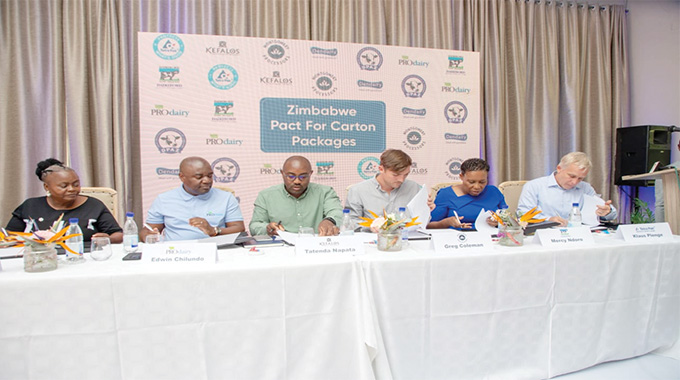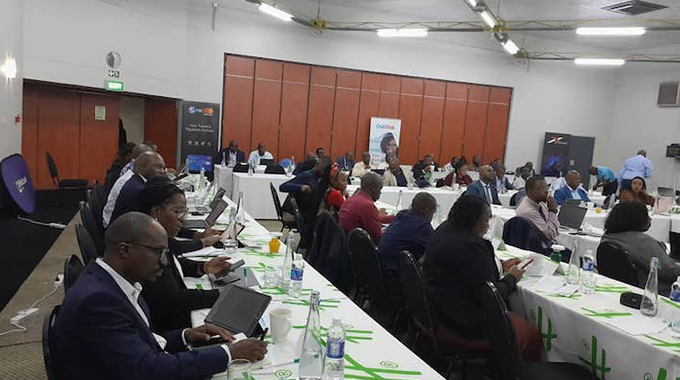Dairy firms, Tetra Pak tackle carton packaging waste

Sikhulekelani Moyo, [email protected]
PLAYERS in the dairy processing sector have partnered with a global packaging company, Tetra Pak, to establish recycling infrastructure in Zimbabwe meant to address the challenge posed by carton packaging waste.
The collaboration includes giant dairy processors such as Dairibord, Kefalos, Prodairy, Dendairy, Montgomery and the Dairy Processors Association of Zimbabwe.
The initiative expects to recycle 1 000 tonnes of carton waste annually, which will help create more downstream economic value.
Responding to questions from Business Chronicle, Tetra Pak southern region sustainability manager, Mr Masale Manoko, said recycling generates economic opportunities by creating jobs for ordinary people from collection and sorting to processing and manufacturing.
He said recycling can also stimulate innovation and investment in new technologies and infrastructure, thereby further contributing to economic growth.

“The Zimbabwe Pact for Carton Packages, a partnership between world-leading food processing and packaging solutions company Tetra Pak in partnership with major stakeholders in the dairy industry, aims to address the challenges posed by carton packaging waste and establish a sustainable recycling infrastructure,” said Mr Manoko.
He said the recycling sector in Zimbabwe has the potential to become a billion-dollar industry, which can create thousands of green jobs for the populace.
Zimbabwe recycles only 10 percent of its waste, hence the need to support, enhance and improve the capacity of the sector.
The country has about 75 established players in the recycling industry, some of whom are involved either directly or indirectly.
Mr Manoko said the key aspects of the partnership include legal recognition where he said carton packaging is acknowledged as a recyclable commodity under the Environment Management Act, providing a solid foundation for efficient recycling practices across Zimbabwe.
Another aspect includes adherence to standards where stakeholders commit to adhering to internationally recognised standards for waste paper, ensuring quality and compatibility with recycling processes.
He said stakeholders under the programme have pledged to collaborate in creating a value chain for used beverage cartons within Zimbabwe’s waste management sector, focusing on developing a sustainable circular economy.
This involves protecting the interests of waste pickers and aggregators and increasing the value of post-consumed packages.
Mr Manoko said in the initial phase, used carton packaging will be exported to South African paper mills, leveraging existing recycling capacity in the region.
“Recycling waste is of paramount importance for several reasons, which include reducing resource depletion. Recycling conserves natural resources by reusing materials instead of extracting new ones. This helps mitigate the depletion of finite resources and preserves biodiversity,” he said.
“Recycling reduces the need for energy-intensive processes involved in extracting, refining, and processing raw materials. Consequently, it helps lower greenhouse gas emissions, which contribute to climate change,” said Mr Manoko.

“Recycling diverts waste from landfills and incinerators, thereby reducing the release of harmful pollutants into the environment. This helps mitigate environmental degradation and protects ecosystems.”
Environmental experts say recycling fosters the transition to a circular economy model where resources are used more efficiently, waste is minimised, and products are designed for reuse and recycling.
This ensures long-term sustainability and resilience against environmental challenges like climate change.
Mr Manoko also added that recycling reduces the need for virgin raw materials, which can be expensive to extract, refine, and process. By using recycled materials, businesses can lower their production costs and improve their bottom line, he added.
He said proper waste management, including recycling, can help businesses and governments save on disposal costs associated with land-filling or incineration and also reduces the burden on municipal waste management systems, potentially leading to lower taxes or fees for waste disposal. — @SikhulekelaniM1.











Comments